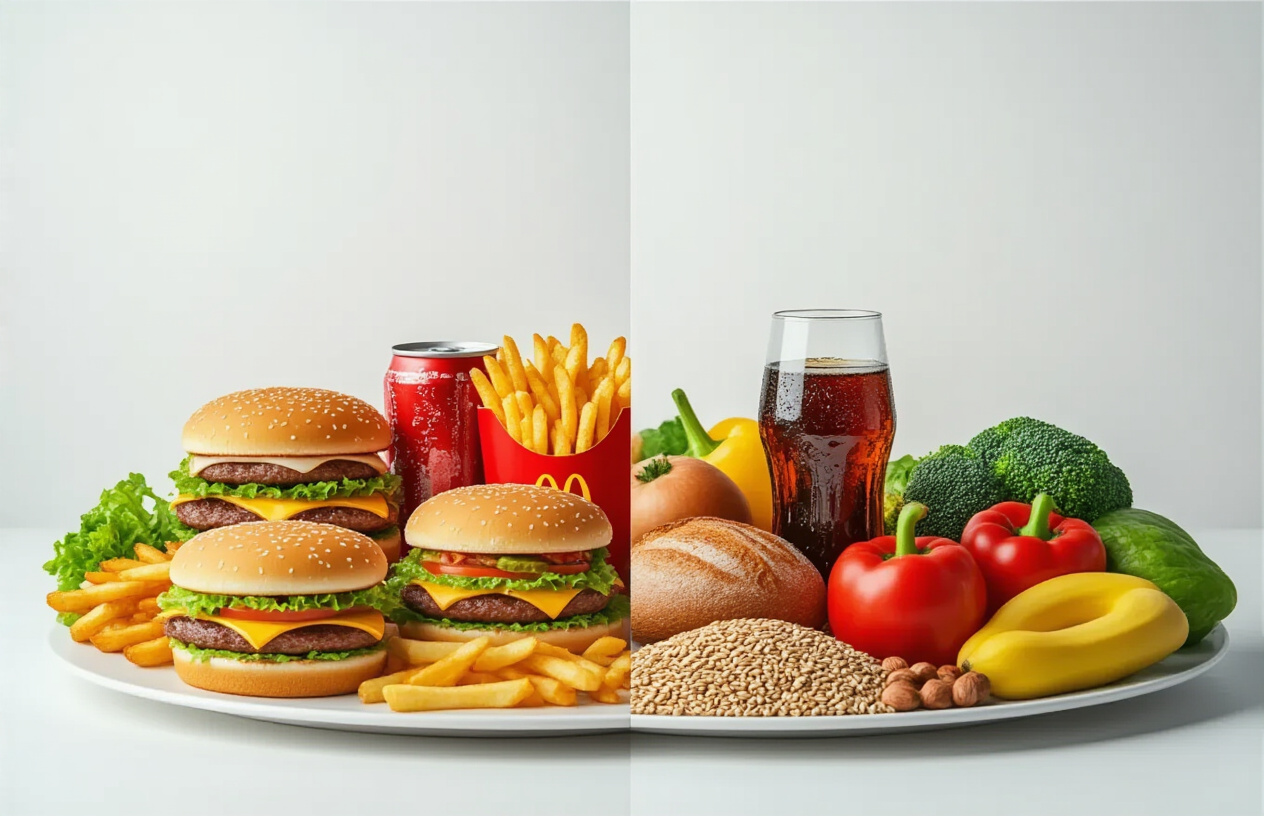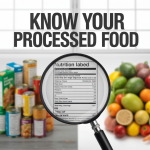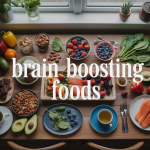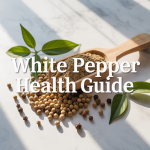Most people today struggle to get all the nutrients they need from food alone, despite eating what they consider a balanced diet. The importance of vitamin and mineral supplements in daily nutrition has become increasingly clear as our modern lifestyle creates unique challenges for optimal health.
This guide is for health-conscious individuals, busy professionals, and anyone wondering if supplements could fill the gaps in their nutrition. Whether you’re already taking vitamins or considering starting, you’ll discover practical insights to make informed decisions about your daily wellness routine.
We’ll explore the nutritional gaps that exist in today’s typical diets and why even fresh, whole foods might not provide everything your body craves. You’ll also learn how to identify which essential vitamins and critical minerals your body needs most, plus simple strategies to maximize how well your body absorbs and uses any supplements you choose to take.
Understanding Nutritional Gaps in Modern Diets

Processed Food Dominance Reduces Nutrient Density
The Western diet has shifted dramatically toward ultra-processed foods, which now make up approximately 60% of the average American’s daily caloric intake. These foods undergo extensive industrial processing that strips away natural vitamins, minerals, and beneficial compounds. While manufacturers often add synthetic vitamins back through fortification, these artificial nutrients don’t match the bioavailability and synergistic effects of their natural counterparts.
Consider the difference between a whole orange and orange-flavored snacks. The fresh fruit delivers vitamin C alongside flavonoids, fiber, and other compounds that work together to enhance absorption. The processed version typically contains isolated ascorbic acid without these supporting nutrients, resulting in diminished nutritional value.
Food manufacturing processes like high-heat treatment, chemical preservation, and extended shelf-life requirements destroy heat-sensitive vitamins like vitamin C, folate, and several B vitamins. Even seemingly healthy processed options like breakfast cereals and energy bars often contain added sugars and artificial ingredients that can interfere with nutrient absorption.
Soil Depletion Affects Mineral Content in Fresh Produce
Modern agricultural practices have significantly reduced the mineral content of our food supply. Over the past 50 years, intensive farming, overuse of chemical fertilizers, and monocropping have depleted soils of essential minerals like magnesium, zinc, iron, and selenium.
A landmark study comparing nutritional data from 1950 to 1999 found that many fruits and vegetables showed substantial declines in protein, calcium, phosphorus, iron, riboflavin, and vitamin C content. For example, broccoli today contains about 35% less calcium than it did in the 1950s.
The problem stems from farming methods that prioritize yield over nutritional quality. Chemical fertilizers typically contain only nitrogen, phosphorus, and potassium, neglecting the dozens of other minerals that plants naturally absorb from healthy soil. When soil microorganisms are depleted, plants can’t access the full spectrum of nutrients they would normally provide.
| Mineral | Average Decline in Produce (1950-1999) |
|---|---|
| Calcium | 16% |
| Iron | 15% |
| Phosphorus | 9% |
| Magnesium | 8% |
| Vitamin C | 20% |
Busy Lifestyles Limit Balanced Meal Preparation
Time constraints have become the biggest barrier to proper nutrition for most people. The average American spends less than 30 minutes per day on food preparation, compared to over 2 hours in the 1960s. This dramatic shift has led to increased reliance on convenience foods, takeout, and restaurant meals.
Working professionals often skip meals entirely or grab whatever’s available, leading to irregular eating patterns and poor food choices. Meal planning requires time many people simply don’t have, especially when juggling work responsibilities, family obligations, and social commitments.
The rise of food delivery apps and pre-packaged meals, while convenient, typically offers limited nutritional variety. Even well-intentioned individuals who try to eat healthily may find themselves eating the same few foods repeatedly, missing out on the diverse range of nutrients that comes from varied dietary choices.
Stress also plays a role in nutrient depletion. Chronic stress increases the body’s demand for certain vitamins and minerals, particularly B vitamins, vitamin C, and magnesium, while simultaneously making it harder to maintain healthy eating habits.
Food Storage and Transportation Diminish Vitamin Potency
The journey from farm to table often takes weeks or even months, during which many nutrients degrade significantly. Water-soluble vitamins like vitamin C and B vitamins are particularly vulnerable to loss during storage and transportation.
Produce is often harvested before peak ripeness to withstand shipping, meaning it never develops its full nutritional potential. Fruits and vegetables can lose 15-77% of their vitamin C content within a week of harvest, depending on storage conditions. Light exposure, temperature fluctuations, and extended storage times all contribute to nutrient loss.
Freezing and canning processes, while extending shelf life, also reduce nutritional content. Flash-freezing can preserve some nutrients better than fresh produce that’s been stored for weeks, but both methods result in some vitamin loss. Canned vegetables often lose water-soluble vitamins during the blanching process before packaging.
Even proper refrigeration can’t prevent all nutrient degradation. Leafy greens lose significant amounts of folate and vitamin C within days of purchase, while root vegetables maintain their nutrients longer but still experience gradual decline over time.
The global food system means that produce may travel thousands of miles before reaching consumers, spending days or weeks in various storage facilities and transportation vehicles. This extended timeline between harvest and consumption makes it nearly impossible to obtain optimal nutrition from whole foods alone, especially for people living in areas with limited access to local, freshly harvested produce.
Essential Vitamins Your Body Needs Daily

Water-soluble vitamins support energy metabolism
Water-soluble vitamins dissolve easily in water and play crucial roles in converting food into energy your body can use. Unlike their fat-soluble counterparts, these vitamins aren’t stored in large amounts, so you need them daily through food or supplements.
The B-complex family includes eight distinct vitamins that work together like a well-oiled machine. Thiamine (B1) helps your body break down carbohydrates for energy, while riboflavin (B2) supports cellular energy production and keeps your skin healthy. Niacin (B3) aids in DNA repair and cholesterol metabolism, and pantothenic acid (B5) is essential for hormone production and fat metabolism.
Pyridoxine (B6) assists in protein metabolism and neurotransmitter synthesis, affecting your mood and cognitive function. Biotin (B7) supports healthy hair, skin, and nails while helping metabolize fats and proteins. Folate (B9) is critical for DNA synthesis and red blood cell formation, especially important during pregnancy. Cobalamin (B12) maintains nerve function and helps produce red blood cells.
Vitamin C stands alone as a powerful antioxidant that supports collagen production, immune function, and iron absorption. Your body can’t make vitamin C, making dietary intake or supplementation necessary.
Signs of deficiency include fatigue, weakness, poor concentration, and frequent infections. Since these vitamins flush out through urine, toxicity is rare but possible with extremely high doses.
Fat-soluble vitamins enhance immune function
Fat-soluble vitamins require dietary fats for proper absorption and get stored in your liver and fatty tissues. This storage capability means you don’t need them as frequently as water-soluble vitamins, but deficiencies can take longer to correct.
Vitamin A comes in two forms: retinol from animal sources and beta-carotene from plants. This vitamin maintains healthy vision, especially night vision, and supports immune cell production. Your white blood cells depend on adequate vitamin A to function properly, making it your first line of defense against infections.
Vitamin D acts more like a hormone than a traditional vitamin. Your skin produces it when exposed to sunlight, but many people don’t get enough sun exposure. Vitamin D regulates calcium absorption, supports bone health, and modulates immune responses. Recent research shows its role in reducing inflammation and supporting respiratory health.
Vitamin E protects cell membranes from oxidative damage and supports immune function. It works closely with selenium to maintain healthy red blood cells and muscle function. This vitamin also helps your body use vitamin K effectively.
Vitamin K comes in two main forms: K1 from leafy greens and K2 from fermented foods and animal products. Both forms support blood clotting and bone metabolism. Vitamin K also helps regulate calcium deposits in arteries, supporting cardiovascular health.
| Vitamin | Primary Sources | Key Functions | Daily Needs |
|---|---|---|---|
| A | Liver, carrots, sweet potatoes | Vision, immunity | 700-900 mcg |
| D | Sunlight, fatty fish, fortified foods | Bone health, immunity | 600-800 IU |
| E | Nuts, seeds, vegetable oils | Antioxidant protection | 15 mg |
| K | Leafy greens, fermented foods | Blood clotting, bone health | 90-120 mcg |
Antioxidant vitamins protect against cellular damage
Your body constantly battles free radicals – unstable molecules that can damage cells and contribute to aging and disease. Antioxidant vitamins neutralize these harmful compounds, protecting your cellular structure and supporting long-term health.
Vitamin C serves as your body’s primary water-soluble antioxidant. It regenerates other antioxidants like vitamin E, creating a protective network throughout your system. Beyond its antioxidant properties, vitamin C supports collagen synthesis, wound healing, and iron absorption. Stress, smoking, and intense exercise increase your vitamin C needs significantly.
Vitamin E protects cell membranes from lipid peroxidation, a process where free radicals attack fatty acids in cell walls. This protection is especially important for brain cells, which have high fat content. Vitamin E also supports immune function by protecting immune cells from oxidative stress during infection responses.
Beta-carotene and other carotenoids act as precursors to vitamin A while providing independent antioxidant benefits. These compounds give fruits and vegetables their vibrant colors and concentrate in eye tissues, protecting against age-related macular degeneration and cataracts.
The synergistic relationship between antioxidant vitamins means they work better together than alone. Vitamin C helps regenerate vitamin E, while vitamin E protects vitamin A from oxidation. This teamwork explains why whole foods often provide better antioxidant protection than isolated supplements.
Your antioxidant needs increase with age, environmental pollution exposure, UV radiation, and physical stress. Athletes and people living in polluted areas may require higher intakes to maintain optimal cellular protection.
Critical Minerals for Optimal Health Performance

Calcium and Magnesium Strengthen Bone Density
Your bones aren’t just static structures holding you up – they’re living tissues constantly breaking down and rebuilding. Calcium gets most of the attention when people talk about bone health, and for good reason. About 99% of your body’s calcium lives in your bones and teeth, creating the mineral framework that gives them strength. Adults need roughly 1,000-1,200 mg daily, but here’s the catch: your body can only absorb about 500-600 mg at once, so timing matters.
Magnesium plays an equally crucial role that often gets overlooked. This mineral activates vitamin D, which your body needs to actually use calcium effectively. Without enough magnesium, calcium can’t do its job properly. Magnesium also helps convert vitamin D into its active form and directly supports bone-forming cells called osteoblasts. The recommended daily intake sits around 310-420 mg for adults.
The partnership between these two minerals extends beyond bones. Magnesium helps regulate calcium levels throughout your body, preventing calcium from building up in soft tissues where it doesn’t belong. Many people get adequate calcium from dairy, leafy greens, and fortified foods, but magnesium deficiency is surprisingly common, affecting nearly half of all Americans.
Iron Prevents Fatigue and Supports Oxygen Transport
Iron deficiency ranks as the most common nutritional deficiency worldwide, affecting roughly 1.6 billion people. When iron levels drop, your energy crashes because this mineral sits at the center of hemoglobin, the protein that carries oxygen from your lungs to every cell in your body. Without enough iron, your tissues literally can’t breathe properly.
Your body contains about 3-4 grams of iron total, with most of it locked up in red blood cells. The rest gets stored in your liver, spleen, and bone marrow as backup reserves. Men typically need around 8 mg daily, while women of reproductive age require 18 mg due to monthly blood loss. After menopause, women’s needs drop back to 8 mg.
Two types of dietary iron exist: heme iron from animal sources and non-heme iron from plants. Your body absorbs heme iron much more efficiently – about 15-35% compared to just 2-20% for non-heme iron. Vitamin C dramatically improves non-heme iron absorption, which is why pairing spinach with citrus or bell peppers makes nutritional sense. Coffee, tea, and calcium can block iron absorption, so timing your supplements away from these makes a difference.
Zinc Boosts Immune Response and Wound Healing
Zinc might be a trace mineral, but its impact on your health is anything but trace. This mineral supports over 300 enzyme reactions in your body and plays starring roles in immune function, protein synthesis, and DNA creation. Your immune system particularly depends on zinc to produce and activate T-cells, your body’s specialized infection fighters.
Adults need about 8-11 mg of zinc daily, and deficiency symptoms can appear quickly since your body doesn’t store zinc long-term. Poor wound healing, frequent infections, hair loss, and taste changes often signal low zinc levels. Athletes and people under stress burn through zinc faster than average, making supplementation more critical for these groups.
Zinc also supports healthy skin by regulating oil production and fighting inflammation. Many acne treatments contain zinc for exactly this reason. The mineral helps maintain your sense of taste and smell too – which explains why zinc lozenges became popular for treating colds, though research on their effectiveness remains mixed.
Food sources include oysters (the richest source), red meat, poultry, beans, and nuts. Plant-based zinc is less easily absorbed due to compounds called phytates, so vegetarians often need higher intakes to meet their needs.
Potassium Regulates Blood Pressure and Heart Function
Potassium works like your body’s internal electrician, maintaining the electrical gradients that make your heart beat and muscles contract. This mineral balances sodium’s effects, helping your kidneys flush out excess salt while keeping blood pressure in check. Most adults need around 3,500-4,700 mg daily – significantly more than sodium’s 2,300 mg limit.
The modern diet creates a problematic potassium-to-sodium ratio. Processed foods load you up with sodium while stripping away potassium, creating the perfect storm for high blood pressure. Studies show that increasing potassium intake can lower systolic blood pressure by 3-11 mmHg in people with hypertension.
Your heart muscle depends on potassium for proper rhythm. Too little potassium can cause irregular heartbeats, muscle weakness, and fatigue. Your kidneys tightly regulate potassium levels, but certain medications, kidney disease, and excessive sweating can throw this balance off.
Fruits and vegetables provide the best potassium sources: bananas, potatoes, spinach, beans, and avocados top the list. Unlike many other minerals, potassium from food rarely causes problems, but supplements can be dangerous in large doses, potentially disrupting heart rhythm. Most over-the-counter potassium supplements contain only 99 mg per pill for safety reasons.
Identifying Personal Supplement Requirements

Age-related nutritional needs vary significantly
Your body’s supplement requirements change dramatically throughout your life. Children and teenagers need higher amounts of calcium, vitamin D, and iron to support rapid growth and bone development. Their metabolisms run faster, and they’re building the foundation for lifelong health.
Adults in their 20s and 30s often focus on maintaining energy levels and supporting busy lifestyles. B-vitamins become crucial for stress management and cognitive function. Women in this age group typically need extra folate, especially if pregnancy is a possibility.
People over 40 start experiencing natural changes in how their bodies process nutrients. Stomach acid production decreases, making it harder to absorb vitamin B12 from food sources. Bone density begins declining, making calcium and vitamin D supplementation more important.
Seniors face unique challenges with nutrient absorption and often take medications that can interfere with vitamin and mineral uptake. They frequently need higher doses of B12, D3, and may benefit from omega-3 fatty acids for brain health and inflammation control.
Gender-specific deficiencies require targeted supplementation
Men and women have distinctly different nutritional needs that go beyond basic calorie requirements. Women need nearly twice as much iron as men due to monthly menstrual cycles. This difference becomes even more pronounced during pregnancy and breastfeeding, when iron requirements can triple.
Men typically require more zinc to support testosterone production and prostate health. They also need higher amounts of certain antioxidants like lycopene and selenium. However, men should be cautious with iron supplementation unless specifically recommended by a healthcare provider, as excess iron can accumulate and cause health problems.
Women going through menopause experience significant hormonal changes that affect bone density and cardiovascular health. Calcium, magnesium, and vitamin D become especially important during this transition. Many women also benefit from omega-3 supplements to help manage mood changes and inflammation.
Lifestyle factors influence supplement selection
Your daily habits and environment play a huge role in determining which supplements will benefit you most. People who work night shifts or spend most of their time indoors often develop vitamin D deficiencies, regardless of their diet quality.
Athletes and people with demanding exercise routines need additional support for muscle recovery and energy production. Magnesium, B-vitamins, and electrolyte replacement become priorities. Endurance athletes may also need extra iron and vitamin C to support oxygen transport and immune function.
Vegetarians and vegans face specific challenges in getting complete nutrition from food alone. Vitamin B12 is virtually impossible to obtain from plant sources, making supplementation essential. Iron absorption from plant foods is less efficient, so pairing iron supplements with vitamin C can help. Other nutrients of concern include omega-3 fatty acids, zinc, and vitamin D.
People who drink alcohol regularly may need extra B-vitamins, as alcohol interferes with absorption and increases excretion of these nutrients. Smokers require significantly more vitamin C to counteract oxidative damage.
Medical conditions may increase nutrient demands
Certain health conditions create additional nutritional needs that food alone can’t meet. People with digestive disorders like Crohn’s disease, celiac disease, or irritable bowel syndrome often struggle with nutrient malabsorption and may need higher doses of multiple vitamins and minerals.
Diabetes affects how your body processes nutrients and can increase the need for chromium, alpha-lipoic acid, and omega-3 fatty acids. Blood sugar medications can also deplete certain B-vitamins over time.
Heart disease patients often benefit from CoQ10 supplements, especially if they take statins, which can reduce the body’s natural production of this important compound. Fish oil supplements may also help reduce inflammation and support cardiovascular health.
People taking proton pump inhibitors for acid reflux face increased risk of B12, magnesium, and iron deficiencies. Long-term use of these medications significantly reduces stomach acid, which is necessary for proper nutrient absorption.
Autoimmune conditions create inflammatory stress that increases the need for antioxidants like vitamins C and E, selenium, and omega-3 fatty acids. The medications used to treat these conditions can also affect nutrient status and require monitoring.
Maximizing Supplement Absorption and Effectiveness

Timing Supplements with Meals Enhances Bioavailability
The human digestive system works like a well-orchestrated machine, and feeding it supplements at the right moments can make all the difference. Fat-soluble vitamins (A, D, E, and K) need dietary fats to properly absorb into your bloodstream. Taking these with a meal containing healthy fats – think avocado toast or a handful of nuts – can boost absorption rates by up to 300%.
Water-soluble vitamins like B-complex and vitamin C work differently. Your body processes these quickly and doesn’t store them long-term. Taking them on an empty stomach often works best, but if you experience nausea, pairing them with a light snack prevents stomach upset without significantly impacting absorption.
Iron supplements deserve special attention since they can cause digestive discomfort. Taking iron with vitamin C-rich foods like orange juice or bell peppers actually enhances absorption while reducing potential side effects. However, avoid calcium-rich foods or supplements within two hours of iron intake, as calcium can block iron absorption.
Magnesium works best when taken in the evening, as it promotes muscle relaxation and better sleep quality. Probiotics require different timing altogether – taking them 30 minutes before meals or with meals helps the beneficial bacteria survive stomach acid and reach your intestines alive.
Combining Complementary Nutrients Improves Uptake
Smart nutrient pairing creates synergistic effects that amplify benefits beyond what individual supplements provide. Vitamin D and calcium work as the perfect team – vitamin D helps your intestines absorb calcium more efficiently, while calcium needs adequate vitamin D levels to properly mineralize bones.
B-vitamins function best as a complex rather than individually. These vitamins work together in energy metabolism pathways, and taking them together ensures your body has all the cofactors needed for optimal function. Splitting B-vitamin doses throughout the day maintains steady blood levels since these water-soluble vitamins clear from your system relatively quickly.
Zinc and copper require careful balancing. While both are essential minerals, too much zinc can interfere with copper absorption. The ideal ratio sits around 8:1 zinc to copper. Many high-quality multi-minerals already account for this balance.
Vitamin C enhances iron absorption from plant sources by converting iron into a more absorbable form. This combination proves especially valuable for vegetarians and vegans who rely on non-heme iron sources. Conversely, certain combinations should be avoided – calcium can interfere with both iron and zinc absorption when taken simultaneously.
Quality Standards Ensure Potency and Purity
Not all supplements are created equal, and understanding quality markers helps you choose products that actually deliver promised benefits. Third-party testing from organizations like NSF International, USP, or ConsumerLab provides independent verification of supplement contents and purity.
Look for supplements that clearly state the active ingredient amounts rather than hiding behind proprietary blends. Reputable manufacturers willingly share certificates of analysis showing exact potency levels, heavy metal content, and microbiological safety data.
Manufacturing practices matter significantly. Supplements produced in FDA-registered facilities following Good Manufacturing Practices (GMP) undergo stricter quality controls. These facilities must maintain detailed records, test raw materials, and validate that finished products contain what labels claim.
Expiration dates aren’t just suggestions – they indicate when potency begins declining. Some vitamins like vitamin C and B-complex degrade faster than others. Buying from companies with high product turnover ensures you receive fresher supplements with maximum potency.
Be wary of supplements making unrealistic health claims or promising miracle cures. Quality supplement companies focus on supporting normal physiological functions rather than making dramatic therapeutic promises that exceed FDA guidelines.
Storage Methods Preserve Supplement Integrity
Proper storage extends supplement shelf life and maintains potency. Heat, light, moisture, and air are the primary enemies of supplement stability. Most supplements prefer cool, dry, dark environments – your medicine cabinet in a steamy bathroom isn’t ideal.
Refrigeration benefits certain supplements, particularly probiotics, fish oil, and some liquid vitamins. However, avoid storing supplements in areas where temperature fluctuates dramatically, like car glove compartments or windowsills.
Original packaging often provides the best protection. Manufacturers design bottles and packaging to shield contents from environmental factors. Transferring supplements to different containers, especially clear ones, can accelerate degradation.
Desiccant packets in supplement bottles aren’t trash – they actively absorb moisture that could compromise product integrity. Keep these packets in the bottles unless specifically instructed otherwise.
Children’s supplements require extra security measures. Store these in child-resistant containers in locations completely inaccessible to curious hands. Even “natural” supplements can be dangerous in large quantities, especially iron-containing products which can be toxic to children.
Check supplements periodically for signs of degradation like unusual colors, odors, or texture changes. Capsules that become sticky or tablets that crumble easily may indicate moisture damage and reduced effectiveness.
Evidence-Based Benefits of Strategic Supplementation

Improved Energy Levels Support Daily Productivity
When your body gets the right vitamins and minerals, you’ll notice a real difference in how energetic you feel throughout the day. B-complex vitamins play a huge role here – they help convert the food you eat into actual usable energy. Studies show that people with adequate B12 levels report feeling less fatigued and more mentally alert during work hours.
Iron deficiency affects millions of people worldwide, and the fatigue that comes with it can be crushing. Research published in the Journal of Nutrition demonstrates that iron supplementation in deficient individuals leads to measurable improvements in work performance and reduced feelings of exhaustion. Women especially benefit from iron support due to monthly losses.
Magnesium works behind the scenes to power over 300 enzymatic reactions in your body. When you’re running low, your cellular energy production suffers. Clinical trials reveal that magnesium supplementation improves exercise performance and reduces muscle fatigue – benefits that translate directly to better daily stamina.
CoQ10 supplements have gained attention for their role in mitochondrial energy production. Athletes and office workers alike report sustained energy levels without the crashes associated with caffeine when taking this supplement regularly.
Enhanced Immune System Reduces Illness Frequency
Your immune system depends on specific nutrients to function at its best, and supplementation can provide measurable protection against common illnesses. Vitamin D stands out as a game-changer – research from Harvard shows that people with adequate vitamin D levels experience 42% fewer respiratory infections compared to those who are deficient.
Zinc supplementation cuts the duration of common colds by an average of 2-3 days when taken within 24 hours of symptom onset. The mineral supports white blood cell function and helps your body mount a faster immune response. Multiple studies confirm that regular zinc supplementation reduces the frequency of upper respiratory infections.
Vitamin C works synergistically with other antioxidants to strengthen your body’s natural defenses. While it won’t prevent every cold, consistent supplementation does reduce the severity and duration of symptoms when you do get sick.
Probiotics deserve special mention here. Clinical evidence shows that specific strains of beneficial bacteria can reduce the incidence of digestive issues and support overall immune function. People taking quality probiotic supplements report fewer sick days and faster recovery times.
Better Cognitive Function Maintains Mental Sharpness
Your brain consumes about 20% of your daily energy, making proper nutrition essential for mental performance. Omega-3 fatty acids, particularly DHA, support brain cell membrane health and neurotransmitter function. Studies tracking cognitive performance over time show that people with higher omega-3 levels maintain better memory and processing speed as they age.
B-vitamins directly impact brain chemistry and mental clarity. B6, B12, and folate work together to produce neurotransmitters like serotonin and dopamine. Research indicates that adequate B-vitamin status correlates with better mood stability and sharper thinking throughout the day.
Vitamin D receptors are found throughout brain tissue, and deficiency has been linked to cognitive decline and mood disorders. Supplementation studies show improvements in executive function and processing speed, particularly in people who started with low levels.
Magnesium plays a crucial role in nerve transmission and brain plasticity. Clinical trials demonstrate that magnesium supplementation can improve learning capacity and memory formation. Many people notice better focus and reduced brain fog when their magnesium status improves.
Antioxidants like vitamin E and selenium protect brain cells from oxidative damage that accumulates over time. Long-term studies suggest that consistent antioxidant supplementation may help preserve cognitive function and reduce the risk of age-related mental decline.

Most of us struggle to get all the nutrients we need from food alone, especially with today’s busy lifestyles and processed food choices. The reality is that even with our best efforts, nutritional gaps exist in our diets, leaving us deficient in crucial vitamins like D, B12, and folate, along with essential minerals such as magnesium, iron, and zinc. These nutrients play vital roles in everything from energy production to immune function, making strategic supplementation a smart addition to a healthy lifestyle.
The key lies in understanding your individual needs rather than taking a one-size-fits-all approach. Getting blood work done, paying attention to your body’s signals, and choosing high-quality supplements that your body can actually absorb makes all the difference. When done right, supplementation can fill those nutritional gaps and support your overall health goals. Start by identifying which nutrients you might be missing, then work with a healthcare provider to create a supplement plan that works specifically for you.









